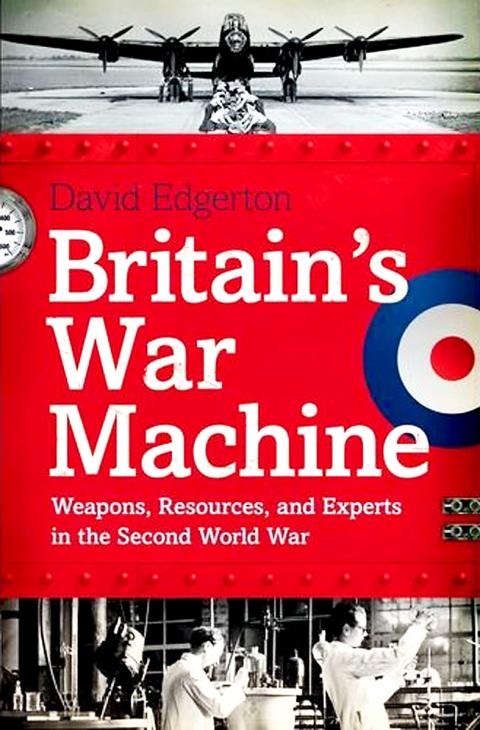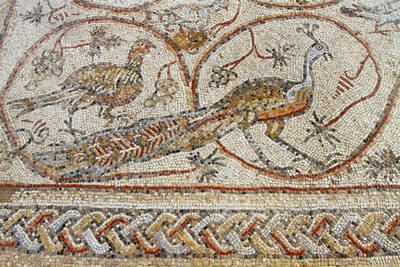For fifty years, writes David Edgerton, the British have been brought up believing that in 1939 the country stood alone against the might of the German war machine, a plucky but woefully under-equipped little island. It initially suffered setbacks, and finally won the war in 1945 thanks to the intervention of the far more powerful US.
Edgerton is a professor at London’s Imperial College, and in Britain’s War Machine he argues that, contrary to the popular view, the UK was in 1939 a sophisticated war machine itself, richer and better equipped than Germany, supported by supplies from a variety of trading partners (notably in South America and Asia) and in almost every way justified in being confident of a rapid and comprehensive military victory.
Edgerton has been prominent in academic circles in reassessing World War II in a variety of ways, and hopes that with this book he will pass on the fruits of recent research — his own and that of others — to the general reader.

The UK in the 1930s, he argues, was far from being the nation “enfeebled” by pacifism among its electorate, let alone industrial backwardness. It was in essence a warfare state, organized around the successful prosecution of war, albeit of a very specific kind (a new kind of machine-based conflict).
The background to Britain’s entry into the war, he states, was not one of weakness, isolation and austerity, as is often argued, but of an abundance of key resources. During the conflict imports remained at pre-war levels, most food was not rationed, and the availability to the government of scientific experts was unparalleled in world history.
Interwar Britain, he writes, was a military superpower at sea and in the air, and had the world’s largest arms industry. Even in 1945 it remained “easily Europe’s largest economy and, second only to the United States, a massive global trading presence.”
Food was one example of the country’s wealth and comfort during the 1930s, Edgerton demonstrates. Britain imported foodstuffs from the empire, of course, but also from Western Europe, Scandinavia, the US, Central and South America and the Far East. Even during the war many kinds of food remained relatively plentiful. Not all meat was rationed, and the several millions being looked after in government canteens, notably the armed forces, were exceptionally well fed.
It’s often believed, Edgerton writes, that the British armies won courageous victories against better-equipped forces. On the contrary, the UK lost battles in North Africa, and against the Japanese in Southeast Asia, fighting armies that possessed inferior equipment, or — as was the case with medium and heavy tanks in North Africa — comparable equipment but deployed in smaller numbers.
Edgerton is especially strong on the role played by experts in the UK’s war effort. They were an alliance of scientists, intellectuals, and quirky aristocrats (“sunk in rural idiocy” in the eyes of many), and they frequently distrusted each other. But they won through in the end, Edgerton says, led by Winston Churchill, a man who was something of an intellectual by the standards of his own party, and a not unworthy winner of the Nobel Prize for Literature.
There’s a lot about bombing, too. I will never forget reading Sven Lindqvist’s extraordinary A History of Bombing (reviewed in the Taipei Times on Nov. 11, 2001), in which he records the outrage of his British hosts when he told them that the UK had bombed Germany’s cities and residential areas very extensively in World War II. It could only have been when they were targets of military importance, they retorted. But Edgerton’s book proves conclusively that the “area bombing” was on a huge scale. By contrast, German bombing of the UK was almost insignificant. “By the end of the war,” Edgerton writes,” [the UK’s] Bomber Command could, in twenty-four hours, drop more bombs on Germany than the tonnage launched against Britain by all the flying-bomb attacks of 1944, and more too than was dropped on London during all the months of the Blitz.”
Indeed, it’s the author’s apparent insensitivity to the moral issues here that constitutes the book’s great weakness. When writing about the UK’s atomic bomb project, for instance, he speculates on whether, had it been brought to completion, it would have ended the war in Europe quicker than was eventually achieved, and mentions in this context what might have been an atomic “coup de grace.” This phrase means kindly putting a victim out of misery. That it could be used to describe a hypothetical atomic attack on continental Europe made me shiver in disbelief.
The book concludes that the UK was spared a “people’s war” of the kind experienced in eastern Europe, where tens of millions died through hunger, disease, small arms fire and improvised poison gas. “The Red Army,” the author writes, “had to take Berlin street by street, losing more dead in that campaign than the entire number killed in the British army through the whole war.”
All in all, though, contrary to the author’s presumed intentions, this book highlights the horrors of war, especially wars supported by the cold efficiency of scientific calculation and planning. As for the bombing of German cities, this had long been, Edgerton states, part of the plan. “The bombing of civilians and industry,” he writes, “was central to British war-like practice from 1940, and to policy long before that. It did not offend British values in warfare; it exemplified them.”
Thus ends this complex, ruthless look at a complex, ruthless piece of history. It might have been inappropriate to the book’s aim to have taken a more moral position, but it’s a great pity it didn’t do so nonetheless. The issue, after all, is blowing human beings apart with high explosives and crushing them alive under falling buildings.

Next week, candidates will officially register to run for chair of the Chinese Nationalist Party (KMT). By the end of Friday, we will know who has registered for the Oct. 18 election. The number of declared candidates has been fluctuating daily. Some candidates registering may be disqualified, so the final list may be in flux for weeks. The list of likely candidates ranges from deep blue to deeper blue to deepest blue, bordering on red (pro-Chinese Communist Party, CCP). Unless current Chairman Eric Chu (朱立倫) can be convinced to run for re-election, the party looks likely to shift towards more hardline

Enter the Dragon 13 will bring Taiwan’s first taste of Dirty Boxing Sunday at Taipei Gymnasium, one highlight of a mixed-rules card blending new formats with traditional MMA. The undercard starts at 10:30am, with the main card beginning at 4pm. Tickets are NT$1,200. Dirty Boxing is a US-born ruleset popularized by fighters Mike Perry and Jon Jones as an alternative to boxing. The format has gained traction overseas, with its inaugural championship streamed free to millions on YouTube, Facebook and Instagram. Taiwan’s version allows punches and elbows with clinch striking, but bans kicks, knees and takedowns. The rules are stricter than the

“Far from being a rock or island … it turns out that the best metaphor to describe the human body is ‘sponge.’ We’re permeable,” write Rick Smith and Bruce Lourie in their book Slow Death By Rubber Duck: The Secret Danger of Everyday Things. While the permeability of our cells is key to being alive, it also means we absorb more potentially harmful substances than we realize. Studies have found a number of chemical residues in human breast milk, urine and water systems. Many of them are endocrine disruptors, which can interfere with the body’s natural hormones. “They can mimic, block

Nearly three decades of archaeological finds in Gaza were hurriedly evacuated Thursday from a Gaza City building threatened by an Israeli strike, said an official in charge of the antiquities. “This was a high-risk operation, carried out in an extremely dangerous context for everyone involved — a real last-minute rescue,” said Olivier Poquillon, director of the French Biblical and Archaeological School of Jerusalem (EBAF), whose storehouse housed the relics. On Wednesday morning, Israeli authorities ordered EBAF — one of the oldest academic institutions in the region — to evacuate its archaeological storehouse located on the ground floor of a residential tower in